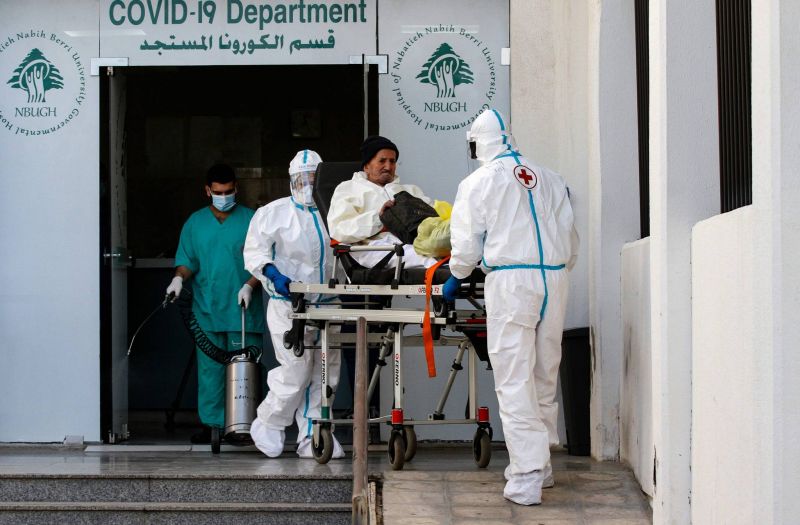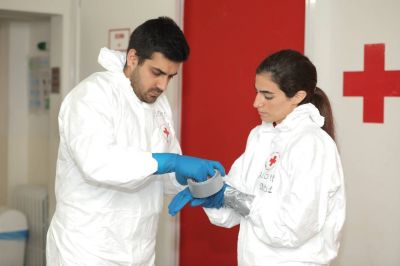
Members of the Lebanese Red Cross, clad in protective gear, transfer an elderly coronavirus patient to the COVID-19 department of the Nabih Berri Governmental University Hospital in the southern Lebanese town of Nabatieh on Saturday. (Credit: Mahmoud Zayyat/AFP)
“I feel more secure on a mission with a positive patient than being out in society,” says Christina el-Hage, 27, who has been a first aid worker with the Lebanese Red Cross for 10 years.
“It is true that I fear infecting my family, but what reassures me is that no volunteers have been infected on call, but rather when they have been in society,” she explains.
More than 50 first aid workers have been infected since the outbreak of the novel coronavirus in Lebanon in February 2020.
Recently, as the number of cases in Lebanon explodes and experts sound the alarm over the situation, Red Cross ambulances have been transferring around 100 suspected coronavirus patients to hospitals every day.
On Jan. 7, the first day of a three-week countrywide lockdown, Lebanon registered a record 4,774 new cases.
The Red Cross has carried out more than 10,000 positive or potential COVID-19 missions since Feb. 25, 2020.
Hage is part of a team of 2,302 first aid workers trained for emergency response calls. She explains that most calls to the Red Cross emergency number are from older people, as they often develop breathing difficulties, a symptom of the virus.
For a home visit to a positive or suspected coronavirus patient, first responders wear protective clothing and equipment “that completely covers us,” Hage says. The patient is typically also given equipment to limit any infection risk.
Thus, a “coronavirus mission” is costly: over $600, compared to $200 for a regular emergency call.
In collaboration with the Ministry of Public Health, the Red Cross decides where to transfer positive patients.
But hospitals are barely keeping up with the increasing number of hospitalizations, and in light of the shortage of hospital beds, it has become more challenging to find an establishment to accommodate patients. This leaves the young first responder feeling “powerless.”
“There is no more room in hospitals; that is the sad reality,” Hage says in dismay.
If the nearest hospitals are full, the Red Cross team, made up of two to three first aid workers responsible for transporting COVID-19 patients, must find a solution in cooperation with the patient and their relatives, especially if the latter know a doctor working in a certain hospital. The team must also coordinate with the Red Cross management center.
“We are sometimes criticized by families who think that we do not want to transport a patient to a hospital. But we can’t do that until we get confirmation from the hospital [that the patient will be admitted], except in cases of a life-threatening emergency,” says Nabih Jabr, undersecretary-general of the Lebanese Red Cross.
If the patient is a critical case, they are transported to the nearest ER following a very strict procedure to avoid any cross-infection risk.
“Once treated, the patient is transferred to another hospital,” explains Chawky Amineddine, director of the training department and coordinator of the COVID-19 emergency response at the Lebanese Red Cross. Hage adds that sometimes patients are escorted back home after being treated at the ER.
But the end of a mission does not mean that the work is done for first responders, who, after dropping off the patients, still have to follow a special protocol to carefully remove their clothing and equipment in an isolated location and then disinfect the ambulance — a process that takes between 15 and 20 minutes.
“After each mission, I have mixed feelings. I am stressed and exhausted, but I am also very proud of what we are doing. Today, I am waiting to see the light at the end of the tunnel,” says Hage.
Given the huge surge in coronavirus cases, the Red Cross has nevertheless had to adapt. “With positive tests sometimes exceeding 3,000 per day, and after the Aug. 4 Beirut port blast, we have equipped all our ambulances to be able to transport COVID-19 patients. We have also trained more first responders,” explains Amineddine. More than 200 volunteers a month have been trained in the recent period.
In the same vein, Hage does not hide her dismay and disappointment when talking about the videos she saw circulating online of Lebanese celebrating New Year’s Eve without any precautions whatsoever.
“All the volunteers’ sacrifice, work and efforts have been almost for nothing,” she says. “The Lebanese do not seem to be taking the situation seriously. It is a shame when I see that almost one year into the pandemic, some people are still not complying with health measures. They are probably unaware of the gravity of the situation and the suffering of the sick.”
This article was originally published in French in L’Orient-Le Jour. Translation by Sahar Ghoussoub.
